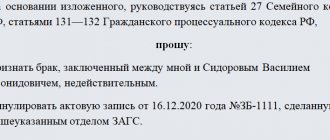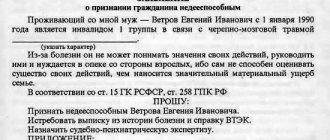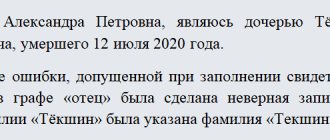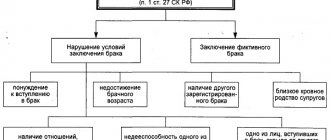Any testamentary act can be challenged in court, but it cannot always be recognized as illegitimate. Invalidating a will is a rather complicated procedure, therefore, in order to achieve this goal, a number of situations and factors should be taken into account when it can actually be challenged and annulled. To do this, you need to have evidence of the illegitimacy of the document and have a sufficient base of legal knowledge or find a specialist who will help you win the case and achieve justice.
In what cases can a will be declared invalid?
The grounds for recognizing an order as illegitimate are presented:
- indicating false information;
- drawing up a document by several people at once;
- lack of notarization;
- violation of the rights of legal successors;
- drawing up a document under psychological or physical pressure;
- establishing in a document conditions that violate public order;
- admission of critical errors in the text of the document;
- a forged signature under a will;
- writing an order in a mentally unstable state;
- execution of the order in a non-documentary form;
- absence of witnesses during document certification (in cases where the presence of witnesses is mandatory).
If at least one of the points listed above is present, the testamentary act can be challenged and declared illegitimate.
Grounds for invalidation
The grounds are general and special. The grounds and procedure for invalidating a will are determined in each specific case individually.
General grounds include, in particular:
- Violation of current legislation;
- Complete or partial incapacity of the testator;
- Inability of the testator to control his actions (severe disability or mental disorder);
- Drawing up a document when violence is used against the testator or the threat thereof.
The difference between general grounds and special ones is that they apply to all civil transactions. Special ones are used only in relation to wills and are presented in the form of the following grounds:
- Failure to comply with the obligation to write a document;
- There is no proper assurance;
- Absence of the signature of the testator or his executor in the document when the testator is limited in movement;
- Drawing up a will in the presence of unauthorized witnesses;
- Absence of witnesses if their presence is required;
- The making of a will is not in the hands of the testator;
- Signing by the executor of a closed or emergency will.
Example . Citizen Kantemirov wrote his will during his lifetime in the presence of witnesses. The witnesses certified their participation in the preparation of the document with their signatures. At the time of writing the statement, Kantemirov chose his friend Ivanov and neighbor Burdzhanov as witnesses. After his death, the testator's relatives did not agree with the distribution of property, most of which he left to the son of his partner. In court, the relatives were able to challenge the will on the grounds that the witness Burzhdanov did not speak Russian and could not be a witness when drawing up the document.
You need to understand that the cancellation of a will and its invalidation is decided by the exclusive competence of the judge. He is free to decide whether certain circumstances influenced the testator at the time of drawing up the document or not.
Important: By a court decision, not only the entire will, but also its individual clauses can be declared invalid.
Invalid will: types of document
All illegitimate testamentary acts are divided into two types and are:
- Disputable. These notarial documents are subject to challenge in court by persons claiming a violation of their successive rights. Most often, they are either dissatisfied with their inherited share or are completely deprived of the inheritance.
- Insignificant. These orders are drawn up by an incapacitated testator or are drawn up with violations in the document. Such wills are initially deprived of legal force. They are declared invalid without a court decision, but to confirm their invalidity a court order must be obtained.
Often invalid testamentary acts are voidable.
When a will loses legal force
A will cannot lose legal force if there is only a single copy. It may not have this force initially (without proceedings on a claim to declare it invalid), if it is not notarized. A will may be given the status of invalid during legal proceedings initiated at the request of a dissatisfied citizen.
Document requirements
The main principle of the validity of a will is the certification received from a notary. That is, the alienator must contact any selected notary office during his lifetime and carry out the procedure for drawing up and certifying a will. The procedure can be open with the text being read by a notary or, alternatively, closed.
The document must accurately indicate information about the heirs, as well as about the property objects and assets assigned to them (money, shares in an LLC, shares, shares, etc.). To do this, it is better to bring originals or copies of all kinds of papers (property and personal).
Claim for invalidation of a will
The statement of claim must contain the following information:
- the name of the branch of the court where the claim is filed;
- information about the applicant and respondent (place of residence and full name);
- data about third parties. This paragraph indicates information about the notary who certified the will;
- cost of the claim;
- the text of the statement;
- the applicant's requirements;
- list of documents;
- plaintiff's signature and date.
Download the statement of claim for invalidation of the will (sample)
What to write in the final part of the application?
At the very end of the appeal to the court, it is necessary to state the claims, as well as the grounds on which they should be satisfied. In the pleading part, you should demand that the will be invalidated, indicating the person who wrote this document and in whose name it was drawn up. You can also specify additional requirements regarding the claim of inherited property or other features of the case. After this, a list of documents attached to the claim is given:
- copies of the claim according to the number of participants in the proceedings;
- a will, with all its annexes or additional documents, if any;
- death certificate of the testator on whose behalf the last order was drawn up;
- birth certificate, if we are talking about a minor heir;
- papers confirming the conclusion and dissolution of a marriage when the deceased was the plaintiff’s spouse;
- other documents that could affect the outcome of the proceedings.
Make copies of all documents, have them certified by a notary, or you will have to take the originals with you to the meeting. If you apply through a representative, do not forget to provide a power of attorney. At the end of the application it is necessary to put the exact date of filing the claim and the signature of the plaintiff. The petition will be reviewed within five days to decide whether to return it to you or set a trial date.
Free initial consultation with a lawyer Let's look at your legal situation or question. We'll tell you what to do next. Call - it's free:
- For residents of Moscow and Moscow Region:
- Other regions of Russia:
As an advertisement
Download sample statements of claim
- Statement of claim for invalidation of a will (30 kB)
- Statement of claim for invalidation of a will (199 kB)
The procedure for invalidating a will: the plaintiff’s procedure
In order for a testamentary act to be recognized as illegitimate, one must file a claim with the court and wait for a decision to be made on this issue. Before going to court with a claim, the applicant must:
- Determine the reason for the invalidity of the claim, justifying it with a number of necessary evidence.
- Collect evidence. These include witness statements, recordings of conversations, photographs and videos.
- Identify the defendant and other persons whom the plaintiff wants to involve in the proceedings. A notary may act as a third party.
Then you need to:
- File a claim.
- Pay the state fee.
- Collect the necessary documents and submit them along with the claim to the court.
- Participate in all court-ordered hearings.
Depending on what decision is made, further actions should be taken regarding the situation. If the judge decides that the will should be upheld, the applicant can appeal his decision. If the issue is resolved in favor of the plaintiff, then it is necessary to take the court decision and go with it to the notary office conducting the inheritance case to further resolve the problem.
If the successor has already received the property, then after the will is declared invalid, he will be obliged to transfer it to the new owner. If the heir refuses, the court decision will be transferred to the executive authorities.
In what cases can consideration of a claim be rejected or postponed?
In some cases, the court may refuse to accept the statement of claim or postpone consideration of the case until errors made in drawing up the claim are corrected. Such errors include:
- Violation of the procedure by which the jurisdiction of the case is determined.
- Lack of plaintiff's signature on the document.
- Filing a claim by a person with limited legal capacity.
- The presence on a document of a signature of a person who did not have the right to sign it.
The application will be rejected if:
- The testamentary deed case had already been dealt with by the court, and a settlement agreement had been concluded between the applicant and the defendant.
- The applicant had already filed a claim in the past, but during the course of the case, he withdrew it.
- The decision on the invalidity of the order had previously been made in another branch of the court.
Also, the statement of claim will be rejected if it was filed in another court.
What to do in case of refusal
There are often situations when the court refuses to accept a claim.
In such cases, the applicant's further course of action will depend on the reason for the refusal. According to the provisions of Article 134 of the Civil Procedure Code of the Russian Federation, a judge refuses to accept a claim for proceedings if:
- The application is subject to consideration in a different order;
- The circumstances described in the claim do not violate the rights of the plaintiff and do not affect his interests. In this category of cases, the persons whose rights may be violated are heirs or legatees, which does not exclude the possibility of filing an application by the legal representatives of these citizens;
- The claim was filed by a representative who was not fully empowered to do so;
- Previously, a claim of similar content had already been considered, and a decision was made on it, or the plaintiff abandoned his claims. If the decision has already been made, the applicant can only seek its review.
Please note! Within 5 days from the date of receipt of the application, the judge is obliged to issue a reasoned decision to refuse to accept the claim. And if the applicant considers it unlawful, a private complaint is filed against the determination within 15 days to a higher authority. In this case, the complaint is filed through the court that issued the ruling.
The return of the claim is made within the same period as the refusal. In this case, the return of the claim does not prevent its re-presentation if the plaintiff eliminates the violations identified by the judge.
According to the provisions of Article 135 of the Civil Procedure Code of the Russian Federation, the following may be grounds for returning an application:
- Filing an application to an inappropriate authority (jurisdiction violated);
- The claim is not signed or signed by a person who does not have full legal capacity (limited or incapacitated). In such cases, the right to go to court is vested in the legal representatives of the plaintiff, for example, guardians, parents of a minor child, as well as representatives acting on the basis of a notarized power of attorney;
- Requirements of similar content have already been filed and are being considered in another court.
A decision to leave the application without progress is made in the event that violations are identified regarding the form and content of the claim (the content does not meet the requirements or an incomplete package of application documents has been collected).
In such situations, the judge sets a reasonable period for eliminating the violations, after which, if the plaintiff ignores the court’s demands, the application is returned to the plaintiff.
Documents for the statement of claim
When filing a claim, the applicant must attach evidence of the defendant’s guilt, which will influence the court and lead to the deprivation of the testamentary instrument of legal force. In addition, the statement of claim should be supplemented with:
- Documents confirming the applicant's rights to inherited property (disposition or birth certificate).
- Certificate of death of the testator.
- Receipt for payment of state duty.
Also, the above-described package of documents can be supplemented with papers confirming the ownership rights to the property that went to the heir specified in the order, and other documents that will prove the plaintiff’s case.
It should be noted that each participant in the trial must have his own copy of the claim.
Procedure costs
Before the start of the trial and during its conduct, the plaintiff will be required to pay for a possible examination of the signature or posthumous verification of the will. These procedures are not always required and their use depends on the situation. Signature examination costs approximately 6.5 thousand rubles, and verification costs about 20 thousand. In addition to these expenses, a state fee is also paid, which varies depending on the cost of the statement of claim, or more precisely, on the price of the bequeathed property. It will not include the entire price of the bequeathed property, but only that part that the plaintiff will dispute.
| Cost of claim | State duty amount |
| Less than 20 thousand rubles. | 4% of the claim amount, but not less than 400 rubles. |
| From 20 to 100 thousand rubles. | 800 rub. + 3% of the amount exceeding 20 thousand rubles. |
| From 100 to 200 thousand rubles. | 3,200 rub. + 2% of the amount exceeding 100 thousand rubles. |
| From 200 thousand to 1 million rubles. | 5,200 rub. + 1% of the amount exceeding 200 thousand rubles. |
| More than 1 million rubles. | 13,200 rub. + 0.5% of the amount exceeding 1 million rubles. (maximum – 60 thousand rubles) |
Who can act as a plaintiff
The applicants may be:
- A government organization that could become an heir after the death of the testator. This most often happens when the testator is left without heirs and bequeaths all his property to charity.
- Legal heirs who were not specified in the will. Most often, it is the children of the testator who challenge the will, due to the fact that they were not included in the will and did not receive their share of the inheritance. But it makes sense to challenge the invalidity of an order only if there is significant evidence of this fact.
- Successors from the category of those that were indicated in the previous order, but were not included in its new edition.
But there are other people who can become applicants and try to invalidate the will.
Carrying out an examination
To declare a will invalid, as evidence, the plaintiff may provide the results of the following examinations:
- Handwriting research. It is resorted to if the applicant suspects that the signature on a document is fake.
- Posthumous. The procedure is carried out if the plaintiff suspects that the testator was in an inadequate state when drawing up the notarial document. This examination is carried out only if the death of the testator occurred within a short time after the writing of the will.
An expert assessment is often carried out before filing a claim. In this case, the expert's reports will act as evidence that should be attached to the claim.
On what basis can a claim be filed?
There are sufficient grounds on which a will can be revoked or partially revoked. Among the common ones:
- declaring the originator incompetent. The most common reason for challenging a will. If the drafter was of advanced age, then without a certificate of legal capacity, heirs whose rights are infringed by the will may try to challenge it. In the process of clarification, the court accepts as evidence the records in the hospital record of the deceased and other facts;
- conflicting instructions. If the testator included facts in the will that contradict each other, it can be challenged and canceled;
- content that is contrary to law. The text of the will cannot contain instructions for heirs that are contrary to current legislation. In this case, it may be considered void;
- drawing up a will under threats or other influences. If the heirs or other interested parties can prove that the will in the will was imposed on the maker, then the document is annulled.
Thus, whether a will will be declared invalid largely depends on the testator himself. Whether the will will be challenged or revoked depends on how correctly he draws up the document.
Arbitrage practice
Judicial practice shows that very often applicants, wishing to challenge a will, turn to the court for help without collecting enough evidence. It is for this reason that there are quite a lot of refusals to satisfy the claims. There are also plenty of reasons for filing an application. For example, if the heir decides to delay the notarization of documentation, he can file a claim to deprive the order of legal force. But if the applicant is clearly sure that the will contains gross errors or that the testator wrote it under pressure, he needs to collect evidence and then he has every chance to prove that he is right and have the will recognized as illegitimate.
Consequences of the procedure
If the testamentary act is drawn up in a single copy and it is declared invalid, then all the successors indicated in it lose their right to the inheritance that is stated in the document. But they have the right to obtain it legally. Only the heir who has no family ties with the deceased testator can be deprived of this opportunity.
If the order is partially invalidated, then the heirs lose their right to only part of the property specified in the act.
If there are several wills and the last one has been deprived of legal force, then the first version of the document automatically becomes valid, even if it indicates the same heirs as in the illegitimate version.
If the successors based on the will are heirs and legally, and they have not been recognized as unworthy, then, regardless of the situation, they can receive their part of the inheritance, which is due to them by law.
What does invalidation of a will entail?
The legal consequences of the procedure include the elimination of one or more claimants to an inheritance obtained illegally
In addition, it is worth paying attention to the number of orders drawn up in favor of the beneficiaries. So, if the last one is canceled, then the previous one comes into force
Therefore, the composition of the heirs may change significantly.
If there were no other instructions, then the acquisition of assets remains with the closest relatives, who, by law, come first (Article 1142 of the Civil Code).
Question:
What does judicial practice on refusals indicate?
Answer:
Often the authority refuses to satisfy the requirements for appealing the inheritance procedure and the validity of the will. Such examples are due to the fact that the applicant himself must prove the violations that occurred when signing the order. However, in some cases the plaintiff still manages to obtain the necessary papers. To do this, it is worth turning to other cases related to the death of a relative. Often, petitioners are helped by claims from other beneficiaries who are trying to challenge the order of distribution of benefits and were able to prove the presence of obstacles to formalizing the expression of will.
Results
In order for the plaintiff to be able to deprive the testamentary act of legal force, he needs to prepare an indisputable evidence base for the illegality of the document. You can file a claim in court on the basis of the incompetent state of the testator, unlawful actions of the heirs against him or violation of the rights of compulsory successors.
To be sure that the will is invalidated, you should thoroughly prepare for the process and involve specialists who can not only advise, but also provide invaluable assistance in dealing with the inheritance.
Read: Liability for the debts of the testator: are debt obligations inherited?








